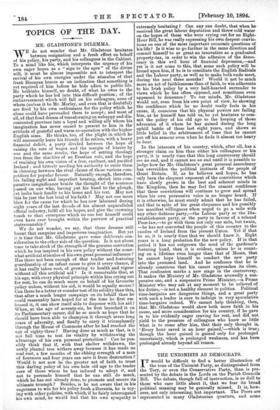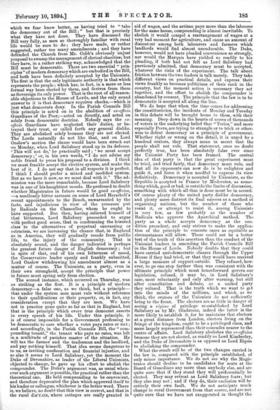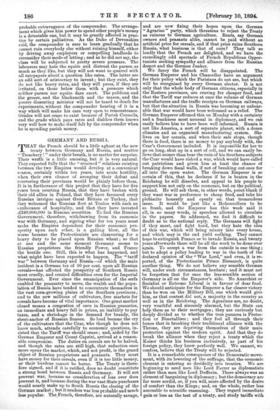THE UNIONISTS AS DEMOCRATS.
IT would be difficult to find a better illustration of the tone of the Unionist Party, as distinguished from the Tory, or even the Conservative Party, than is pre- sented. by the debate in the Lords on the Parish Councils Bill. The debate, though full of instruction, is so dull to those who care little about it, that we fear its broad political meaning may be generally missed. It is, how- ever, not only interesting, but important. The Peers are represented in many Gladstonian quarters, and some which we fear know better, as having tried to "take the democracy out of the Bill ; " but that is precisely what they have not done. They have discussed the Bill very fully, as men so thoroughly familiar with rural life would be sure to do ; they have made, or rather suggested, rather too many amendments ; and they have defended the Church from Mr. Cobb's obviously unjust proposal to swamp the management of clerical charities; but they have, in a rather striking way, acknowledged that the Bill must be democratic. There are two essential " pnn- ciples " of modern democracy which are embodied in the Bill, and both have been definitely accepted by the Unionists. The first is that the only legitimate authority is that which represents the people ; which has, in fact, in a more or less formal way been elected by them, and derives from them as Sovereign its only power. That is the root of all reason- able objections to the House of Lords, and the only sound answer to it is that democracy requires checks,—which is just what democrats deny. In the Parish Councils Bill this principle is acted on in the abolition of ex-officio Guardians of the Poor,—acted on directly, and acted on solely from democratic doctrine. Nobody says the ex- officio Guardians have neglected their duties, or be- trayed their trust, or called forth any general dislike. They are abolished solely because they are not elected. The Lords naturally do not like that, and on Lord Onslow's motion the clause would have been struck out on Monday, when Lord Salisbury stood up in its defence. This will not do,' he practically said ; we must accept democracy ; ' or, in his own words, "I do not advise my noble friend to press his proposal to a division. I think we must frankly accept the elective system, and make the best of it. I do not say that in all respects it is perfect. I think I should prefer a mixed and modified system. But as we have it now, so we must deal with it." The ad- mission was the more remarkable, because Lord Salisbury was in one of his haughtiest moods. He professed to doubt whether Magistrates in future would be good ex-officios, —a needlessly bitter sarcasm on some of Lord Herschell's recent appointments to the Bench, unwarranted by the facts, and injudicious in view of the pressure put by Radicals on the Chancellor, whom he ought to have supported. But then, having .relieved himself of that bitterness, Lord Salisbury proceeded to argue with perfect good sense, that in condemning the leisured class to the alternatives of perpetual canvassing or ostracism, we are increasing the chance that, in England as in America, they will gradually recede from public life, to the injury of the community. That is absolutely sound, and the danger indicated is perhaps the greatest future danger of English democracy ; but in spite of that, and of his own bitterness of mood, the Conservative leader openly and frankly submitted, Lord Onslow withdrawing his amendment almost as a matter of course. The Unionists, as a party, even in their own stronghold, accept the principle that power in future must spring only from election.
The second instance, which occurred on Thursday, was as striking as the first. It is a principle of modern democracy—a false one, as we think, but a principle— that under the system men must rule without reference to their qualifications or their property, or, in fact, any consideration except that they are men. We have not in practice gone quite so far as that in England, but that is the principle which every true democrat asserts in every speech of his life. Under this principle, it is of course impossible for a Government professing to be democratic to care whether a voter pays rates or not ; and accordingly, in the Parish Councils Bill, the "com- pounding tenant," the tenant who pays no rates, was left in a multitude of parishes master of the situation. He will tax the farmer and the tradesman and the landlord, and pay nothing himself. That idea seems dangerous to to us, as inviting confiscation and financial injustice, and so also it seems to Lord Salisbury, yet the moment the Duke of Devonshire, as leader of the Liberal Unionists, objected to change, he gave up his effort to abolish the compounder. The Duke's argument was, as usual when- ever such argument is possible, the practical rather than the theoretical one. He held compounding to be convenient, and therefore deprecated the plan which approved itself to his leader or colleague, whichever is the better word. There is, we believe, no doubt that this view is correct, and that in the rural dier:cte, where cottages are really granted in aid of wages, and the artisan pays more than the labourer for the same house, compounding is almost inevitable. To abolish it would compel a rearrangement of wages at a very bad moment for agriculture, and cause an amount of discontent among both labourers and farmers which landlords would find almost unendurable. The Duke, however, would not have pleaded convenience so strongly, nor would the Marquis have yielded so readily to his pleading, if both had, not felt as Lord Salisbury had previously admitted, that democracy must be accepted, whatever the risks of the experiment. The talk about friction between the two leaders is talk merely. They take different views on practical details, and express their views frankly as becomes politicians of their rank in the country, but the moment action is necessary they act together, and the effort to abolish the compounder is abandoned by consent. The principle that the law is to be democratic is accepted all along the line.
We do hope that when the time comes for addressing the constituencies, the incidents of Monday and Tuesday in this debate will be brought home to them, with their meaning. Deep down in the hearts of scores of thousands of voters is the underlying belief that "Tories," and more especially Peers, are trying to strangle or to trick or other- wise to defeat democracy as a principle of government. Whether right or wrong on the detail, it is urged by a hundred orators, they always mean in secret that the people shall not rule. That statement, once no doubt perfectly true, has been absolutely false ever since the Unionist Party has been framed. The central idea of that party is that the great experiment must be tried, and tried fairly, that democracy must rule, and that all its opponents can now do is to enlighten and guide it, and force it when needful to express its view definitively. Democracy is accepted by Unionists, as the Republic is accepted in France by Moderates, as some- thing which, good or bad, is outside the limits of discussion, something with which all that is done must be in accord. Of course plenty of the united party dislike democracy, and plenty more distrust its final success as a method of organising nations, but the number of those who resist it, or attempt to resist it, among Unionists is very few, as few probably as the number of Radicals who approve the Anarchical method. The party as a whole accepts democracy as the con- dition precedent, and only strives to make the applica- tion of the principle to concrete cases as equitable as circumstances will allow. There could not be a better test of the truth of this assertion than the conduct of the Unionist leaders in amending the Parish Councils BB/ in the House of Lords. Nobody doubts that they could have carried anti-democratic clauses through the Upper House if they had tried, or that they would have received a large measure of support outside. They refused, how- ever, to go one step farther than was consistent with the ultimate principle which must henceforward govern our legislation, refused, it may be, in Lord Salisbury's case, most reluctantly and only after warning, but still after consultation and debate, as a united party they refused. That is the truth which we want to get into the minds of the millions, and which, as we think, the orators of the Unionists do not sufficiently bring to the front. The electors are as little in danger of seeing a regime of privilege re-established by Lord Salisbury as by Mr. Gladstone, indeed the latter is the more likely to establish it, for he maintains that electors at a great distance from London, electors living on the fringe of the kingdom, ought to be a privileged class, and more largely represented than their comrades nearer to the centre of affairs. Lord Salisbury abolishes the ex-officios because they are not elected, as readily as Lord Kimberley, and the Duke of Devonshire is as opposed as Lord Ripon to abolishing the compounder. What the result will be of the two changes carried in the law is, compared with the principle established, of only minor importance. We do not see why the Magis- trates should decline to be candidates for seats at the Board of Guardians any more than anybody else, and are quite sure that if they stand they will preferentially be elected. They may retreat as Lord Salisbury fears ; but they also may not ; and if they do, their exclusion will be entirely their own fault. We do not anticipate much change in rural Government from that source, and are not quite sure that we have not exaggerated in thought the probable extravagance of the compounder. The arrange- ment which gives him power to spend other people's money is a detestable one, but it may be greatly affected in prac- tice by certain palliatives. As the Duke of Devonshire slid, the compounder is sure to learn gradually that he cannot ruin everybody else without ruining himself, either by driving away employers or compelling landlords to reconsider their mode of letting ; and as he did not say, the class will be subjected to pretty severe pressure. The labourers may hate the squire and. distrust the parson as much as they like, but they will not want to quarrel with all ratepayers about a question like rates. The latter are an odd sort of aristocracy to invent ; but they exist, they do not like heavy rates, and they will press, if they are irritated, on those below them with a pressure which neither parson nor squire dare exert. The publican and the grocer, and the blacksmith and the mason, and the poorer dissenting minister will not be taxed to death for experiments, without the compounder hearing of it in a way which will make his ears very open to remonstrance. Grades will not cease to exist because of Parish Councils, and the grade which pays rates and dislikes them knows very well how to make itself felt by the compounder when he is spending parish money.








































 Previous page
Previous page